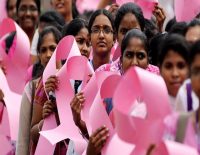Mental disorders in adults over 10% in India, experts discuss way forward

Union Minister of State for Health Dr Bharti Pravin Pawar has said that as per a National Mental Health Survey of India conducted through NIMHANS, Bengaluru in 2016, the prevalence of mental disorders in adults aged above 18 years is “about 10.6 per cent, which is very bad”.
Highlighting the importance of addressing the challenges of mental health, Dr Pawar said “the Union govt is promoting the availability of and access to cost-effective treatment of common mental disorders”. The government considers mental health an important public health concern, and the work on it from boosting facilities to training doctor and other experts, is being done in a “mission mode”.
Dr Pawar was speaking at a national conference on mental healthcare hosted by the National Human Rights Commission (NHRC) here. She informed that mental health has been included in the flagship Ayushman Bharat scheme of the Union Govt. She also stated that “since the launch of the National Tele-Mental Health service, 42 Tele-Manas cells have been established that has already recorded over 2 lakh calls”. She asserted that it is critical to remove the stigma that prevents individuals from seeking help.
“Mental health is an integral part of our health as it affects all aspects of our lives,” Dr Pawar said, adding that it affects people cutting across age, sex, social and economic status of individuals.
Justice Arun Mishra, NHRC chairperson, said that one out of 10 persons suffers from one or different kinds of mental disorders. He added that, “addressing mental health requires a comprehensive approach encompassing healthcare, education, public policy and social support systems.”
Stressing on the need for empathy, not sympathy towards mental illness, he made a strong case for mental health to be given the same importance as physical health. “We need integration of mental health, substance abuse, general medical care and hospital and community care, which are poorly coordinated”, he stated.
Justice Mishra stated that “without mental health, there is no health”. He underscored the need to mobilize efforts to raise awareness of mental health issues. He stated, “We must integrate mental health education into our schools, colleges and workplaces. Setting up healthy boundaries with social media is also necessitated.”








Comments